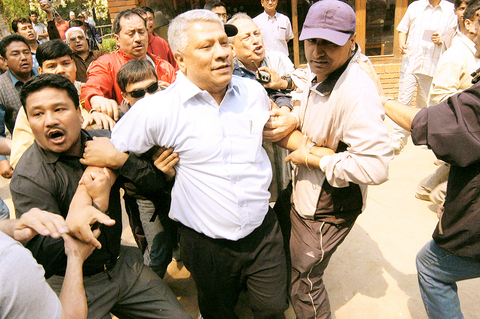About ten thousand people marched through Nepal's capital yesterday, demanding the restoration of democracy in the biggest show of opposition strength since King Gyanendra seized absolute power three months ago.
In two rallies organized by unions to commemorate May Day, demonstrators carried placards calling for an end to the king's direct rule. Gyanendra on Saturday lifted a state of emergency that had given police unlimited powers, but retained direct rule. The demonstrators stayed away from restricted areas around the king's palace and government offices, and police did not interfere with the protests.
In the biggest show of strength since Gyanendra seized power in February, nearly 2,000 people participated in the first rally and another 8,000 in the second march through the streets of Katmandu, watched by people from homes and rooftops.

PHOTO: AP
The protesters carried red flags and chanted: ``We want democracy, down with autocracy.''
Nepal's major political parties vowed yesterday to continue widespread protests to resist the king's absolute rule and to demand the return of democracy in the Himalayan nation, despite the monarch lifting a three-month-old state of emergency. He still rules without an elected government or parliament and there has been no word on the release of hundreds of political workers jailed under emergency rule. Censorship on the media continues and a dozen journalists remain in jail for criticizing the monarchy. Cable operators are still banned from airing Indian news channels, which have been critical of the king's actions.
Gyanendra also extended the term of a royal commission set up under emergency rule to probe corruption during the past 14 years of democratic rule. Several political leaders, including sacked Prime Minister Sher Bahadur Deuba, were arrested recently at the direction of the commission.
The government said emergency was lifted because security had improved in Nepal. But Kashinath Adhikari of the Communist Party of Nepal said that, "The ban on protests in the main areas of Katmandu is an example that there is still authoritarian rule in Nepal."
The surprise lifting of the state of emergency followed the king's return on Friday from visits to China, Indonesia and Singapore, where leaders pressed him to restore democracy. At an African-Asian Summit in Indonesia days ago, Gyanendra met several leaders including Prime Minister Manmohan Singh of India and UN Secretary General Kofi Annan. Annan urged Nepal to "return to constitutional rule as soon as possible."
The meeting with Singh was crucial, because India -- a key arms source for Nepal's fight against the communist insurgency -- suspended military aid after Gyanendra's power grab. Singh agreed to resume it after Gyanendra reportedly assured him that Nepal would restore democracy.

PRECARIOUS RELATIONS: Commentators in Saudi Arabia accuse the UAE of growing too bold, backing forces at odds with Saudi interests in various conflicts A Saudi Arabian media campaign targeting the United Arab Emirates (UAE) has deepened the Gulf’s worst row in years, stoking fears of a damaging fall-out in the financial heart of the Middle East. Fiery accusations of rights abuses and betrayal have circulated for weeks in state-run and social media after a brief conflict in Yemen, where Saudi airstrikes quelled an offensive by UAE-backed separatists. The United Arab Emirates is “investing in chaos and supporting secessionists” from Libya to Yemen and the Horn of Africa, Saudi Arabia’s al-Ekhbariya TV charged in a report this week. Such invective has been unheard of

‘TERRORIST ATTACK’: The convoy of Brigadier General Hamdi Shukri resulted in the ‘martyrdom of five of our armed forces,’ the Presidential Leadership Council said A blast targeting the convoy of a Saudi Arabian-backed armed group killed five in Yemen’s southern city of Aden and injured the commander of the government-allied unit, officials said on Wednesday. “The treacherous terrorist attack targeting the convoy of Brigadier General Hamdi Shukri, commander of the Second Giants Brigade, resulted in the martyrdom of five of our armed forces heroes and the injury of three others,” Yemen’s Saudi Arabia-backed Presidential Leadership Council said in a statement published by Yemeni news agency Saba. A security source told reporters that a car bomb on the side of the road in the Ja’awla area in

US President Donald Trump on Saturday warned Canada that if it concludes a trade deal with China, he would impose a 100 percent tariff on all goods coming over the border. Relations between the US and its northern neighbor have been rocky since Trump returned to the White House a year ago, with spats over trade and Canadian Prime Minister Mark Carney decrying a “rupture” in the US-led global order. During a visit to Beijing earlier this month, Carney hailed a “new strategic partnership” with China that resulted in a “preliminary, but landmark trade agreement” to reduce tariffs — but

SCAM CLAMPDOWN: About 130 South Korean scam suspects have been sent home since October last year, and 60 more are still waiting for repatriation Dozens of South Koreans allegedly involved in online scams in Cambodia were yesterday returned to South Korea to face investigations in what was the largest group repatriation of Korean criminal suspects from abroad. The 73 South Korean suspects allegedly scammed fellow Koreans out of 48.6 billion won (US$33 million), South Korea said. Upon arrival in South Korea’s Incheon International Airport aboard a chartered plane, the suspects — 65 men and eight women — were sent to police stations. Local TV footage showed the suspects, in handcuffs and wearing masks, being escorted by police officers and boarding buses. They were among about 260 South